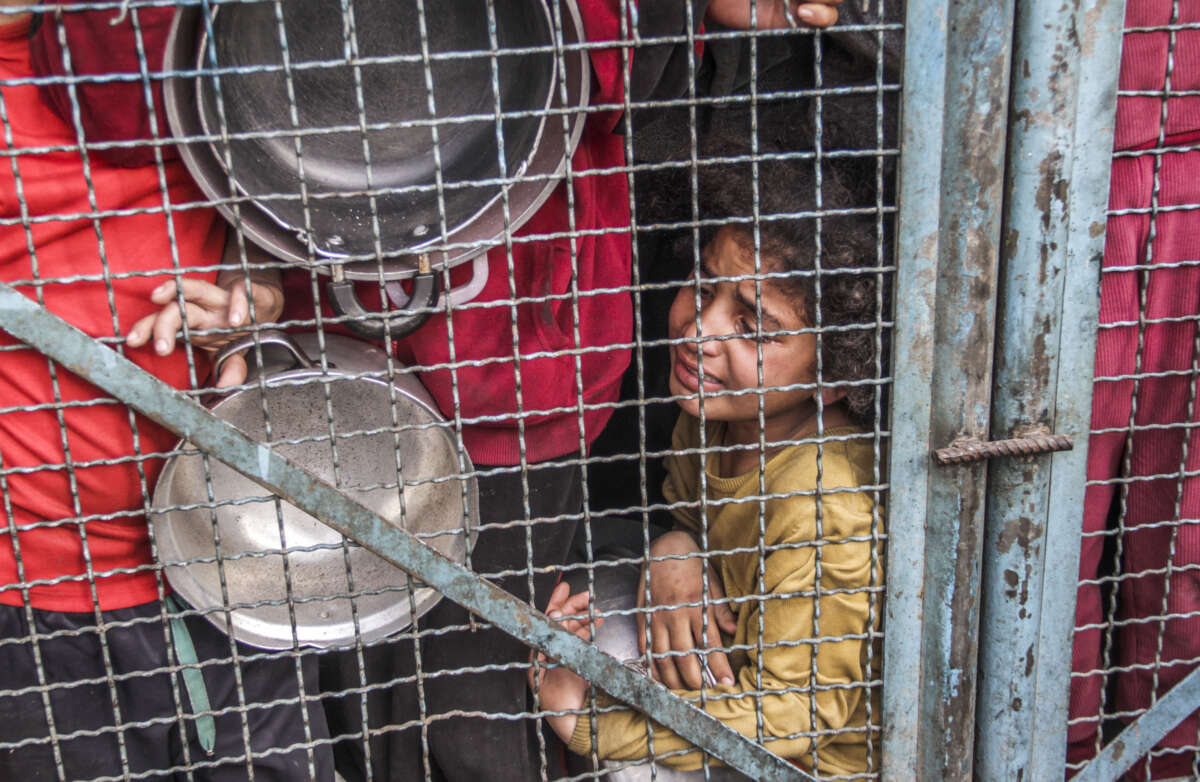For months, Israel has been forcing Palestinians in northern Gaza to starve on a tiny fraction of their regular daily calorie needs, a report finds as experts warn of an unprecedented widespread famine across the region.
A new Oxfam analysis has found that, since January, people in northern Gaza have had access to less than 12 percent of the 2,100 calories they need per day on average. This is equivalent to an average of only 245 calories per day — fewer calories than are in a can of fava beans, or about a single cup of cooked rice.
“Before the war, we were in good health and had strong bodies,” one mother who is trapped in northern Gaza told Oxfam. “Now, looking at my children and myself, we have lost so much weight since we do not eat any proper food, we are trying to eat whatever we find — edible wild plants or herbs daily just to survive.”
The lack of food is being caused by Israel’s blockade of all forms of humanitarian aid into Gaza, which is only expected to get worse in coming weeks. Israel has informed the UN Relief and Works Agency for Palestine Refugees (UNRWA) that it will no longer allow any food shipments into northern Gaza. Meanwhile, after Israel bombed a convoy of international food aid workers with World Central Kitchen earlier this week, killing seven of them, a number of other food aid groups have announced that they are stopping their efforts in Gaza because of the high risk of being killed by Israeli forces.
This downturn in food aid shipments comes as international food insecurity researchers have warned that half of the population of Gaza, or about 1.1 million people, are at imminent risk of famine, with the entire population already facing a food crisis. Israel’s famine campaign in Gaza has no precedent in modern times in terms of speed and severity, experts have repeatedly warned, and dozens of children have already starved to death as Israel’s genocide goes on.
“Israel is making deliberate choices to starve civilians,” said Oxfam International Executive Director Amitabh Behar in a statement. “Imagine what it is like, not only to be trying to survive on 245 calories day in, day out, but also having to watch your children or elderly relatives do the same. All whilst displaced, with little to no access to clean water or a toilet, knowing most medical support has gone and under the constant threat of drones and bombs.”
Oxfam notes that the Israeli government has detailed knowledge of how much food needs to enter Gaza in order to keep the population alive, and is still blocking the vast majority of aid from entering. According to the group’s report, since October, Israel has only allowed food shipments amounting to 41 percent of the population’s daily caloric needs to enter the region.
Currently, only 105 food trucks are entering Gaza each day on average, while Oxfam has calculated that 221 trucks need to be entering per day at a minimum just to keep people alive, assuming that no food is wasted and that it is all distributed equally.
“Israel is ignoring both the International Court of Justice order to prevent genocide and UN Security Council resolutions. Only last week the ICJ ordered new provisional measures, stating famine is no longer looming, but ‘setting in’ in Gaza,” said Behar. “All countries need to immediately stop supplying arms to Israel and do all they can to secure an immediate and permanent ceasefire; only then can we stop this horrifying carnage for the 2.2 million people who have endured six months of suffering.”
Our most important fundraising appeal of the year
December is the most critical time of year for Truthout, because our nonprofit news is funded almost entirely by individual donations from readers like you. So before you navigate away, we ask that you take just a second to support Truthout with a tax-deductible donation.
This year is a little different. We are up against a far-reaching, wide-scale attack on press freedom coming from the Trump administration. 2025 was a year of frightening censorship, news industry corporate consolidation, and worsening financial conditions for progressive nonprofits across the board.
We can only resist Trump’s agenda by cultivating a strong base of support. The right-wing mediasphere is funded comfortably by billionaire owners and venture capitalist philanthropists. At Truthout, we have you.
We’ve set an ambitious target for our year-end campaign — a goal of $250,000 to keep up our fight against authoritarianism in 2026. Please take a meaningful action in this fight: make a one-time or monthly donation to Truthout before December 31. If you have the means, please dig deep.
